
Norma Jean Beasler is an American country music singer who was a member of The Porter Wagoner Show from 1961–1967. She had 13 country singles in Billboard's Country Top 40 between 1963 and 1968, recorded twenty albums for RCA Victor between 1964 and 1973, received two Grammy nominations, and was a Grand Ole Opry member for several years.

Coat of Many Colors is the eighth solo studio album by American singer-songwriter Dolly Parton. It was released on October 4, 1971, by RCA Victor. The album was nominated for Album of the Year at the 1972 CMA Awards. It also appeared on Time Magazine's list of the 100 Greatest Albums of All Time and at No. 257 on Rolling Stone's 2020 list of the 500 Greatest Albums of All Time. Parton has cited the title track on numerous occasions as her personal favorite of all the songs she has written.

All I Can Do is the seventeenth solo studio album by American singer-songwriter Dolly Parton. It was released on August 16, 1976, by RCA Victor. The album was co-produced by Parton and Porter Wagoner and would be the last of Parton's solo albums to have any involvement from Wagoner. It was nominated for Best Country Vocal Performance, Female at the 19th Annual Grammy Awards. The album spawned three singles: "Hey, Lucky Lady", "All I Can Do", and "Shattered Image".

Dolly is the sixteenth solo studio album by Dolly Parton. It was released on September 15, 1975, by RCA Victor. To differentiate it from Parton's 2009 4-disc, career-spanning box set, which is also titled Dolly, the album is sometimes referred to as Dolly: The Seeker – We Used To.

Porter & Dolly is the thirteenth and final collaborative studio album by Porter Wagoner and Dolly Parton. It was released on August 4, 1980, by RCA Victor. The album is made up of previously unreleased material recorded during Wagoner and Parton's duet years (1967–76), with new studio overdubs. It was released as part of a settlement from legal action Wagoner took against Parton following her departure from his band and syndicated television series. Two singles were released from the album. "Making Plans" peaked at number two on the Billboard Hot Country Singles chart and "If You Go, I'll Follow You" peaked at number 12.

Bubbling Over is the twelfth solo studio album by American singer-songwriter Dolly Parton. It was released on September 10, 1973, by RCA Victor. The album cover photo was shot by Nashville photographer Les Leverett near the fountain at the Country Music Hall of Fame.
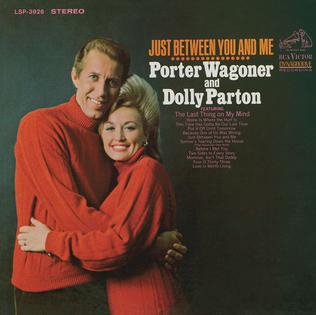
Just Between You and Me is the first collaborative studio album by Porter Wagoner and Dolly Parton. It was released on January 15, 1968, by RCA Victor. The album was produced by Bob Ferguson. It peaked at number eight on the Billboard Top Country Albums chart and spawned one single, "The Last Thing on My Mind", which peaked at number seven on the Billboard Hot Country Songs chart.

Just the Two of Us is the second collaborative studio album by Porter Wagoner and Dolly Parton. It was released on September 9, 1968, by RCA Victor. The album was produced by Bob Ferguson. It peaked at number five on the Billboard Top Country Albums chart and number 184 on the Billboard 200 chart. The album spawned three singles. "Holding on to Nothin'" and "We'll Get Ahead Someday" were top ten hits on the Billboard Hot Country Songs chart, peaking at numbers seven and five, respectively. The third single, "Jeannie's Afraid of the Dark", peaked at number 51.
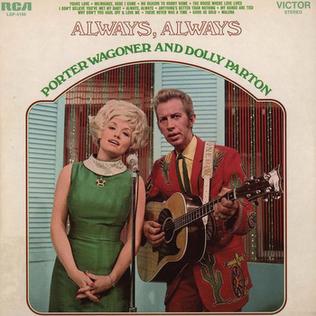
Always, Always is the third collaborative studio album by Porter Wagoner and Dolly Parton. It was released on June 30, 1969, by RCA Victor. The album was produced by Bob Ferguson. It peaked at number five on the Billboard Top Country Albums chart and number 162 on the Billboard 200 chart. "Yours Love" and the album's title track were released as singles, peaking at numbers nine and 16, respectively.

The Fairest of Them All is the fifth solo studio album by American singer-songwriter Dolly Parton. It was released on February 2, 1970, by RCA Victor. The album was produced by Bob Ferguson. It peaked at number 13 on the Billboard Top Country Albums chart. The album's only single, "Daddy Come and Get Me", peaked at number 40 on the Billboard Hot Country Songs chart.

Porter Wayne and Dolly Rebecca is the fourth collaborative studio album by Porter Wagoner and Dolly Parton. It was released on March 9, 1970, by RCA Victor. The album was produced by Bob Ferguson. It peaked at number four on the Billboard Top Country Albums chart and number 137 on the Billboard 200 chart. Two top ten singles were released from the album, "Just Someone I Used to Know" and "Tomorrow Is Forever", peaking at numbers five and nine, respectively. "Just Someone I Used to Know" was nominated for Best Country Performance by a Duo or Group at the 12th Annual Grammy Awards.
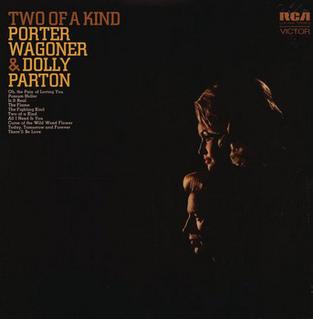
Two of a Kind is the sixth collaborative studio album by Porter Wagoner and Dolly Parton. It was released on February 8, 1971, by RCA Victor. The album was produced by Bob Ferguson. It peaked at number 13 on the Billboard Top Country Albums chart and number 142 on the Billboard 200 chart. No singles were released from the album, but "Oh, the Pain of Loving You" was included as the B-side of the 1971 single "The Right Combination".

The Best of Porter Wagoner & Dolly Parton is a compilation album by Porter Wagoner and Dolly Parton. It was released on July 19, 1971, by RCA Victor. The album contains tracks from each of their collaboration albums released up to that point, with the exception of 1969's Always, Always. The album included one previously unreleased track, the Grammy nominated single, "Better Move It on Home".

The Right Combination • Burning the Midnight Oil is the seventh collaborative studio album by Porter Wagoner and Dolly Parton. It was released on January 3, 1972, by RCA Victor.
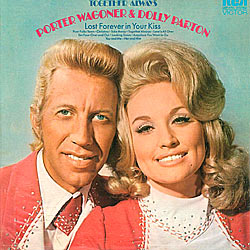
Together Always is the eighth collaborative studio album by Porter Wagoner and Dolly Parton. It was released on September 11, 1972, by RCA Victor.
"The Last Thing on My Mind" is a song written by American musician and singer-songwriter Tom Paxton in the early 1960s and recorded first by Paxton in 1964. It is based on the traditional lament song "The Leaving of Liverpool". The song was released on Paxton's 1964 album Ramblin' Boy, which was his first album released on Elektra Records.
"A Satisfied Mind" is a song written by Joe "Red" Hayes and Jack Rhodes. Hayes explained the origin of the song in an interview: "The song came from my mother. Everything in the song are things I heard her say over the years. I put a lot of thought into the song before I came up with the title. One day my father-in-law asked me who I thought the richest man in the world was, and I mentioned some names. He said, 'You're wrong; it is the man with a satisfied mind.'"

The singles discography of American singer-songwriter Dolly Parton includes over 200 singles and spans seven decades. Parton has released 180 singles as a lead artist, 42 as a featured artist and four promotional singles. Parton has also had two charted B-sides and has released 68 music videos. Parton also released 21 singles with Porter Wagoner from 1968 to 1980, bringing her total number of singles to 243.
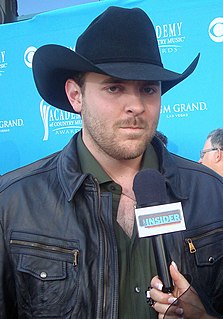
American country music singer and songwriter Chris Young has released eight studio albums, twenty two singles, and nineteen music videos. Ten of his singles have reached number one on either the US Billboard Hot Country Songs or Country Airplay charts. In 2006, Young rose to fame as the winner of season four of American reality singing competition Nashville Star. He released his debut self-titled album in October of that year, which produced two singles that failed to reach the Top 40 of the Country Songs chart.

Get While the Gettin's Good is a studio album by American country singer-songwriter Bill Anderson. It was released in February 1967 on Decca Records and was produced by Owen Bradley. The project was Anderson's sixth studio album and included one single issued. The album itself reached peak positions on the Billboard country albums chart.


















